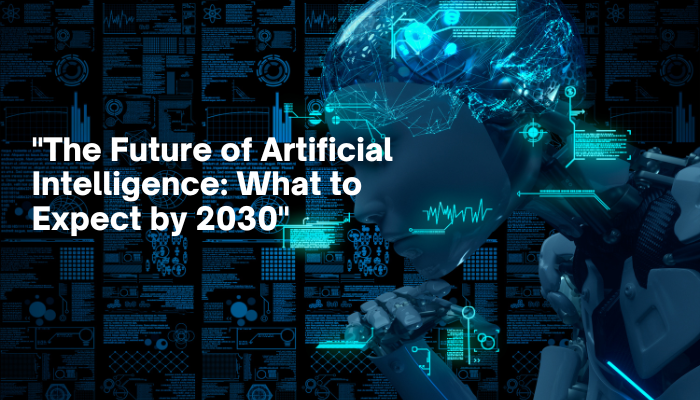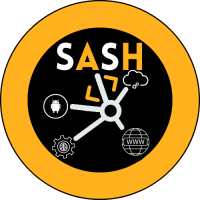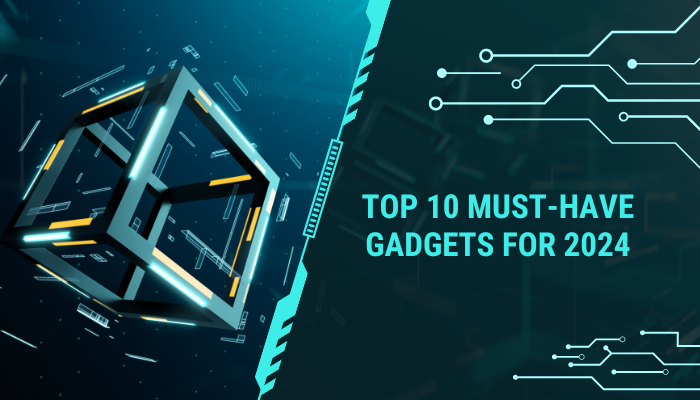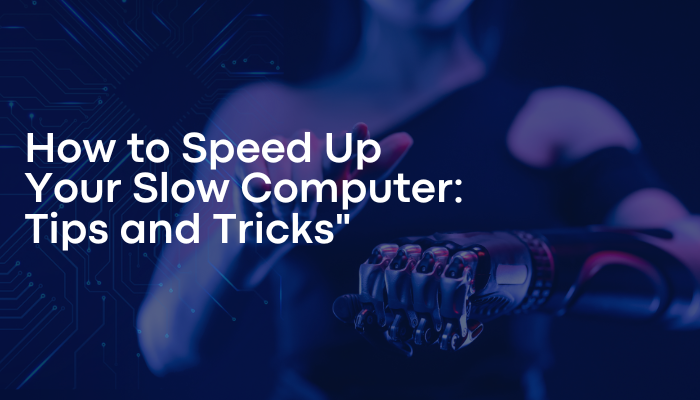Artificial Intelligence (AI) is no longer just a buzzword; it’s a transformative force that’s reshaping industries, economies, and societies. As we look ahead to 2030, the potential of AI is both exciting and daunting. From advancements in healthcare and autonomous vehicles to ethical concerns and job displacement, the next decade will see AI deeply embedded in every aspect of our lives. In this blog, we’ll explore what to expect from AI by 2030 and how it might influence our world.

1. AI in Healthcare: Personalized Medicine and Beyond
By 2030, AI is expected to revolutionize healthcare, making it more personalized, accurate, and efficient. AI-driven diagnostics, predictive analytics, and robotic surgery will become more commonplace, reducing human error and improving patient outcomes.
- Expectations:
- Personalized Treatment Plans: AI will analyze genetic data, lifestyle factors, and medical history to create individualized treatment plans.
- Predictive Analytics: AI models will predict disease outbreaks, patient deterioration, and even mental health crises before they happen.
- AI-Powered Drug Discovery: AI will accelerate the drug discovery process, potentially reducing the time it takes to bring new treatments to market.
2. The Rise of Autonomous Vehicles
Autonomous vehicles (AVs) are expected to be a common sight on the roads by 2030. With advancements in AI, AVs will offer safer, more efficient transportation, potentially reducing traffic accidents and emissions.
- Expectations:
- Widespread Adoption: Many urban areas may adopt AVs for public transportation, ride-sharing, and delivery services.
- Improved Safety: AI algorithms will continuously learn from road data, leading to better decision-making and fewer accidents.
- Regulatory Challenges: Governments will need to establish new regulations to manage the deployment of AVs and address ethical dilemmas.
3. AI and the Workforce: Job Creation and Displacement
The impact of AI on the workforce will be profound, with both job creation and displacement expected. While AI will automate routine tasks, leading to job losses in certain sectors, it will also create new opportunities in AI development, maintenance, and oversight.
- Expectations:
- Automation of Routine Jobs: Roles in manufacturing, retail, and transportation may see significant automation, leading to job displacement.
- New AI-Centric Jobs: The demand for AI specialists, data scientists, and ethicists will surge as businesses integrate AI into their operations.
- Reskilling and Education: Workers will need to acquire new skills to remain competitive in an AI-driven job market, prompting a shift in education and training programs.
4. AI in Education: Customized Learning Experiences
AI has the potential to transform education by offering personalized learning experiences tailored to each student’s needs. By 2030, AI-driven educational tools could make learning more accessible, engaging, and effective.
- Expectations:
- Personalized Learning: AI algorithms will adapt lessons to individual learning styles, helping students grasp concepts at their own pace.
- Virtual Tutors: AI-powered virtual tutors will provide students with on-demand assistance, making education more accessible.
- Predictive Analytics in Education: Schools and educators will use AI to identify students at risk of falling behind and intervene early.
5. Ethical AI: Navigating the Moral Dilemmas
As AI becomes more pervasive, ethical concerns will take center stage. Issues such as bias in AI algorithms, privacy, and the potential for AI to be used in harmful ways will require careful consideration and regulation.
- Expectations:
- Bias and Fairness: AI developers will need to ensure that algorithms are fair and unbiased, avoiding discrimination based on race, gender, or socioeconomic status.
- Privacy Concerns: As AI systems collect vast amounts of data, protecting user privacy will be crucial. Stricter regulations and data protection laws are expected.
- AI Governance: Governments and international bodies will likely establish guidelines and regulations to govern the ethical use of AI, ensuring it benefits society as a whole.
6. AI in Everyday Life: Smart Homes and Personal Assistants
By 2030, AI will be fully integrated into our everyday lives, making our homes smarter and our daily tasks easier. From intelligent personal assistants to AI-driven appliances, our interactions with technology will become more seamless and intuitive.
- Expectations:
- Smart Homes: AI will manage everything from energy use to security, creating more efficient and comfortable living environments.
- Advanced Personal Assistants: AI-powered assistants will anticipate our needs, schedule tasks, and even manage our health and wellness routines.
- Enhanced Connectivity: AI will facilitate the Internet of Things (IoT), connecting all of our devices and appliances for a truly smart home experience.
7. AI and Creativity: Art, Music, and Beyond
AI’s role in creative fields will expand by 2030, with AI-generated art, music, and literature becoming more sophisticated. While AI may not replace human creativity, it will certainly augment it, offering new tools and possibilities for artists and creators.
- Expectations:
- AI-Generated Art: Artists will collaborate with AI to create innovative and unique works of art.
- Music Composition: AI will assist musicians in composing new pieces, exploring genres, and even performing alongside humans.
- Content Creation: AI will help writers and filmmakers develop stories, scripts, and even direct films, blurring the lines between human and machine creativity.
8. AI in Finance: Smarter Investments and Fraud Detection
The financial sector will see significant AI-driven advancements by 2030. From automating trading to enhancing fraud detection, AI will make financial services more efficient, secure, and personalized.
- Expectations:
- Algorithmic Trading: AI will dominate trading floors, making split-second decisions to maximize profits.
- Personalized Financial Advice: AI-powered financial advisors will provide personalized investment recommendations based on individual goals and risk tolerance.
- Enhanced Fraud Detection: AI will monitor transactions in real-time, identifying and preventing fraudulent activities more effectively.
9. AI and Sustainability: Addressing Global Challenges
AI will play a critical role in addressing global challenges like climate change, resource management, and sustainable development. By 2030, AI-driven solutions could help us create a more sustainable future.
- Expectations:
- Climate Modeling: AI will improve climate models, helping scientists predict and mitigate the impacts of climate change.
- Sustainable Agriculture: AI will optimize farming practices, reducing waste and improving crop yields to meet the demands of a growing population.
- Energy Management: AI will enhance energy efficiency in buildings, transportation, and industrial processes, reducing our carbon footprint.
10. The Convergence of AI with Other Emerging Technologies
By 2030, AI will converge with other emerging technologies like blockchain, quantum computing, and biotechnology, leading to innovations that we can barely imagine today. This convergence will create new possibilities and challenges across various industries.
- Expectations:
- AI and Quantum Computing: Quantum computers will accelerate AI development, solving complex problems that are currently beyond our reach.
- AI and Biotechnology: AI will advance personalized medicine, gene editing, and the development of new therapies.
- AI and Blockchain: AI will enhance blockchain technology, improving security, transparency, and efficiency in decentralized systems.
Conclusion
As we approach 2030, the future of Artificial Intelligence promises to be transformative, with profound implications for every aspect of our lives. While AI offers incredible potential for innovation and improvement, it also poses significant ethical, social, and economic challenges. By anticipating these changes and preparing for them, we can harness the power of AI to build a better, more equitable future.
Stay tuned to our blog for the latest updates and insights on AI and other emerging technologies!


